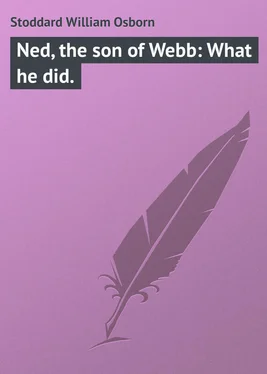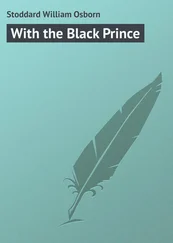William Stoddard - Ned, the son of Webb - What he did.
Здесь есть возможность читать онлайн «William Stoddard - Ned, the son of Webb - What he did.» — ознакомительный отрывок электронной книги совершенно бесплатно, а после прочтения отрывка купить полную версию. В некоторых случаях можно слушать аудио, скачать через торрент в формате fb2 и присутствует краткое содержание. Жанр: foreign_prose, на английском языке. Описание произведения, (предисловие) а так же отзывы посетителей доступны на портале библиотеки ЛибКат.
- Название:Ned, the son of Webb: What he did.
- Автор:
- Жанр:
- Год:неизвестен
- ISBN:нет данных
- Рейтинг книги:5 / 5. Голосов: 1
-
Избранное:Добавить в избранное
- Отзывы:
-
Ваша оценка:
- 100
- 1
- 2
- 3
- 4
- 5
Ned, the son of Webb: What he did.: краткое содержание, описание и аннотация
Предлагаем к чтению аннотацию, описание, краткое содержание или предисловие (зависит от того, что написал сам автор книги «Ned, the son of Webb: What he did.»). Если вы не нашли необходимую информацию о книге — напишите в комментариях, мы постараемся отыскать её.
Ned, the son of Webb: What he did. — читать онлайн ознакомительный отрывок
Ниже представлен текст книги, разбитый по страницам. Система сохранения места последней прочитанной страницы, позволяет с удобством читать онлайн бесплатно книгу «Ned, the son of Webb: What he did.», без необходимости каждый раз заново искать на чём Вы остановились. Поставьте закладку, и сможете в любой момент перейти на страницу, на которой закончили чтение.
Интервал:
Закладка:
"I declare!" he exclaimed. "This bit of a gale is freshening. I'll haul on the main sheet, and bring her head to the wind. She's leaning over a little too much. If a gust or a squall should come on, she might turn turtle."
He evidently knew what it was best to do under such circumstances, and his next exclamation was uttered with even stronger emphasis. He was, of course, doing something in the steering line with his paddle-rudder, and he had taken occasion to look back along the wake of his dashing scow.
"What's this? Who ever knew that Green Lake was so wide? I can't see the other shore, toward our house. There isn't another boat in sight, either. If I expect to get home to-night, it's about time I went about, and headed southerly. This is a curious piece of business. I'll take in my lines, right away."
He shut up his book at once. There was even an anxious tone in his voice, and an exceedingly puzzled look upon his face. It was such, perhaps, as the captain of a line-of-battle-ship might wear upon finding his huge fighting machine in unknown or difficult navigation. Any experienced nautical man would have been able to comprehend Ned's unpleasant situation. That is, perhaps so, if it had been at all possible to know what was the precise nature of the circumstances.
The lines came in fast enough and Ned knew how to tack, if that were indeed the correct thing for him to do next. Now, however, came a second discovery, almost as perplexing as the first. Behind him was a wide waste of water without a visible shore, but he was by no means out of sight of land when he turned to look ahead. The northerly shore of the lake was near, and it was rapidly drawing nearer.
"This is tremendous!" he remarked, and he took a tin cup out of his tackle-box, expressing a hope that the lake water might not prove too warm to drink.
He leaned over the side of the boat, still gazing shoreward, scooped the cup full, and began to drink like a very thirsty fellow.
"Faugh! Phew!" he suddenly sputtered, and a vigorous, choking, coughing spell followed. "What's this? Salt water? How did Green Lake get salted!"
He tasted again, as if to make sure, and then he looked around him utterly bewildered. The shore was all the while drawing nearer, and the water in his cup was of the peculiar brackish flavour that belongs to the great seas.
"Mountains?" he murmured. "I knew there were high hills over this way, but I never was told of anything like this. Right along shore, too. Why, that cliff there's as high as a church steeple. Higher. That's an eagle, too, circling around over the top of it."
Was one side of Green Lake salt and the other fresh, or had it in some mysterious way broken through and become connected with the Atlantic? It even occurred to him to wonder, vaguely, if the lake had joined the ocean in such a way that ships, the Kentucky , for instance, could ever come steaming in, firing salutes and astonishing all the country people. His head was all a buzz of perplexing questions, but he managed to keep hold of his rudder, and speed onward toward the land. In fact, the wind was now very good, and the punt was running rapidly.
"Yonder," he remarked aloud, "is the mouth of a kind of inlet. Those cliffs on each side of it are awful. They're almost perpendicular. It makes a fellow think of some of those pictures of Norway fiords, in the book. The best thing I can do is to steer right in and find out what it is. Tell you what, though, I've sailed farther than I'd any idea of."
He still had some distance to go before reaching the opening between the tall cliffs, and his eyes were busy. He tried the water yet again, curiously.
"I know what sea water is," he thought. "I tried it once, out in New York Bay. This tastes salter than that did. Hullo! Those are porpoises, tumbling around out yonder. I've seen porpoises before, off Long Island, when I went bluefishing with Uncle Jack. I wish he were here to tell me what all this amounts to. He knows a heap."
Perfectly stupendous were those beetling promontories between which the boat sailed in. They must have been several hundreds of feet in height. Here and there, in the clefts and crevices of their rugged sides and along their summits, grew gigantic pines and fir-trees.
"I'll put away the book," he said, "in the locker under the back seat. I'm going ashore. I want to find somebody that can tell me what this means. I won't go home till I know all about it. This isn't any kind of cove, though. It runs away in."
So it did, narrow and deep, and it wound around a rock corner, shortly, so that all view of Green Lake behind him was cut off. It was almost cool in there, as well as shadowy, and Ned felt a kind of shudder going over him. He was not exactly afraid, but his heart was beating more quickly than usual. He had put away the folio with great care, and all of its four hundred and seventy-five splendid illustrations seemed to be running through his memory like a river in a flood-time, after a rousing rain-storm.
"There!" he exclaimed, at last. "There's a landing-place! I can see boats and men and women. Away off yonder, up the slope, houses enough for a village. Hullo! That's a ship at anchor."
Beyond the village, as far as his eyes could search, were more mountains, covered half-way up with forests, but right here before him the fiord widened so as to make a small cliff-guarded harbour of the safest kind. It was really a very beautiful place to visit, if Ned had been at all able, just then, to admire scenery.
"Who would have thought," he exclaimed, "that a fellow could get to such a thing as this is, just by crossing Green Lake!"
CHAPTER IV.
BEHIND THE TIMES
"I wish I had on a better rig," thought Ned, very naturally. "I look like anything."
He felt that he was going in among entire strangers, and that he was not by any means in company dress. He had come out fishing in a pair of blue flannel trousers and a blue woollen outing shirt, with canvas shoes, and wearing the low, brown felt hat he had dived in yesterday. It was dry now, but not handsome. He lowered his sail and began to paddle slowly along, thinking of all sorts of things, and watching sharply for whatever might turn up. He studied the sloop at anchor, as he went past it, and declared that it was a queer enough craft to look at. It was very long, and it was low amidships, with big thole-pins along the rails, as if it were planned to operate occasionally as a rowboat. The stern of it rose very high, so that it might contain a cabin, and so did the bow. Projecting from the latter was an iron-clad beak. It was chisel-edged, and Ned remarked:
"That's a ram, but she doesn't look much like a ship-of-war. Our ironclads have rams, but they never get near enough to other ships to strike with them. Our fighting has to be done with long-range guns. Well! I never saw her like before. Hullo! I see it! She is made like the Norse pirate pictures in that book! She is one of them!"
He was eager enough to go forward now, and he rowed with his eyes at work in all directions. The landing-place was now not far ahead of him. It was provided with a pretty substantial wharf, made of logs and stones. From this a pier of similar construction ran out about fifty feet into the harbour. Upon the deck of the pier, and on the wharf, and along the beach, were scattered men and women, and there were a number of stout-looking rowboats hitched here and there, or pulled up on the shore.
Ned ceased rowing for a full half-minute to stare intensely at the people, and then he exclaimed:
"I guess I'm right about it. These chaps are out and out Norsemen! That biggest man wears an iron topknot, too, and he carries a spear. Every man of 'em has a short sword at his belt, and those are all what the book calls seaxes. I know where I am now. I'm in for it! But how on earth am I ever to get home again in time for supper?"
Читать дальшеИнтервал:
Закладка:
Похожие книги на «Ned, the son of Webb: What he did.»
Представляем Вашему вниманию похожие книги на «Ned, the son of Webb: What he did.» списком для выбора. Мы отобрали схожую по названию и смыслу литературу в надежде предоставить читателям больше вариантов отыскать новые, интересные, ещё непрочитанные произведения.
Обсуждение, отзывы о книге «Ned, the son of Webb: What he did.» и просто собственные мнения читателей. Оставьте ваши комментарии, напишите, что Вы думаете о произведении, его смысле или главных героях. Укажите что конкретно понравилось, а что нет, и почему Вы так считаете.












